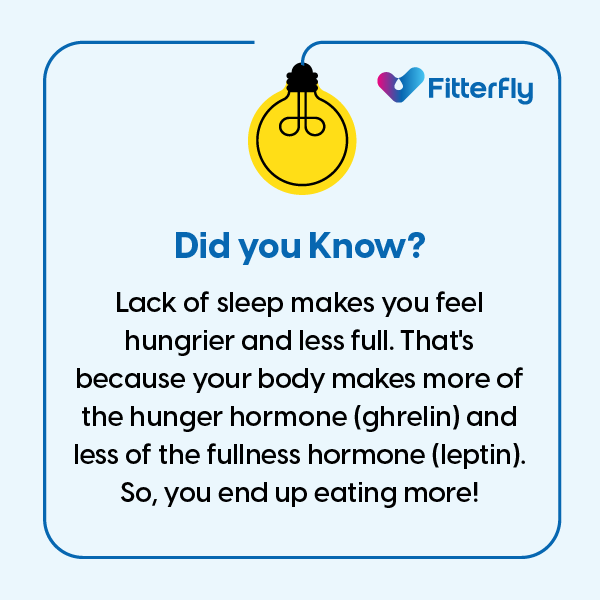Why Good Sleep is Important for Diabetes?

Having trouble sleeping? And then waking up to find your blood sugar has gone haywire?
You’re definitely not alone! A lot of us might not know that poor sleep can negatively affect diabetes. No, you don’t need to jump to these sleeping pills. Getting a good night’s sleep is possible without any medications.
First, let’s understand the simple science behind why sleeping better can help you manage your diabetes better.
And just as we’re getting into this, here’s something we want to share. If you’ve been feeling stuck in a tough or stressful phase, consider a 1:1 online session with our expert psychologists. It’s designed to help you clear your mind and regain your mental peace. Fill out the form below, and let’s take the first step toward your mental wellness!
What is the Connection Between Sleep and Blood Sugar Levels?
To understand this, let’s first talk about how insulin and blood sugar work together.
- When we eat, our body turns the food into glucose, a kind of sugar that gives us energy for everything we do, like standing, talking, moving, or even just sitting.
- Insulin, a hormone, helps move this sugar from our blood into our body’s cells so it can be used as energy.
- But sometimes, our body doesn’t respond well to insulin, making it harder for sugar to get into the cells. This is called insulin resistance and can cause blood sugar levels to rise too high.
How Does Sleep Help You Control Your Blood Sugar Levels & Diabetes?
A good night’s sleep makes our body listen to insulin better. When we’re well-rested, the cells in our body are more willing to let sugar in, which ultimately helps keep our blood sugar at a healthy level.
That’s why sleeping well is important for controlling blood sugar and managing diabetes. However, this process gets disturbed when we don’t get enough sleep.

Can Poor Sleep Increase Your Blood Sugar Levels?
YES! Less sleep or poor quality sleep can totally affect your blood sugar level and, therefore, your Diabetes. How?
So, when you don’t get enough hours of sleep, or your sleep is very disturbed, it makes your body less sensitive to insulin.
And when insulin is not able to do its job well it is not able to move the glucose in our bloodstream to the cells – which means more sugar remains in the blood. And more sugar in the blood = high blood sugar levels.
This is why poor sleep is often linked to an increased risk of type 2 diabetes.
And high blood sugar and poor sleep are like a vicious cycle. One leads to the other. So, the best way to break this cycle is by doing something simple – SLEEP WELL!
Here are 8 clinically validated strategies to help you sleep better at night:
8 Easy Steps for Better Sleep
There are simple and easy techniques that fall under Sleep Hygiene, a collection of practices aimed at ensuring good nighttime sleep quality and full alertness during the day. You can give it a try once:
1. Creating a Healthy, Restful Routine – Dinner Time Habits
- Set regular dinner times.
- Make mealtime a family time.
- Enforce a ‘no devices at the dining table’ rule for everyone.
- Engage in communication, sharing, and laughter.
2. The Bedroom: Remember the 3 C’s – Cool, Comfortable, and Clean
- Adjust your bedroom temperature to what feels best for you, considering the weather.
- Ensure mattresses and pillows are firm, supportive, yet comfortable.
- Keep the bedroom clutter-free and smelling fresh, using essential oils or air humidifiers if needed.
3. Lighting
- Switch to dim or warm lighting in the evenings. Bright lights can disrupt your circadian rhythm, making it hard to sleep at the ideal time.
4. Minimize Screen Exposure
- Disconnect from devices at least 30 minutes before bedtime. Screens can keep your brain alert, preventing it from transitioning to rest mode.
- Set your alarm for the next day, then set your phone aside and practice relaxation techniques.
5. Limit Alcohol and Caffeine Intake
- Avoid caffeine 1-2 hours before bedtime, as it can keep you awake.
6. Engage in Physical Self-Soothing
- Taking a bath or washing your face, feet, and hands 30 minutes before bedtime can help you cool down and relax.
7. Relaxation Techniques
- Breathing Exercises: Try deep breathing, diaphragmatic breathing, or box breathing before bed to regulate breathing, calm the nervous system, and reduce stress.
Watch this video to learn how practising deep breathing before bed can greatly improve your sleep quality and overall well-being.
- Progressive Muscle Relaxation: Helps relax your muscles and control stress and anxiety.
- Humming: Relax facial, neck, and shoulder muscles to fall asleep faster.
8. Sleep Journal
- Keeping a sleep journal to note your sleep duration and disturbances can help identify what affects your sleep quality. Use this information to better manage your sleep.
At Fitterfly, one of the key focus areas in our Diabetes Prime Program is Sleep Management.
From our experience, maximum members have reported that improving sleep quality, coupled with a proper diet and exercise routine, has significantly impacted their blood sugar level, fasting blood sugar levels, and over time, these positive changes are reflected in the HbA1c levels.
Need One More Reason to Sleep Well?
When people don’t sleep well enough, they often feel tired and might eat more sugary foods to get energy. This can lead to weight gain leading to obesity, which increases the risk of diabetes.
Now, don’t steal those desserts from your fridge during the night!!
How Much Sleep Do You Really Need?
Figuring out how much sleep you need can be tricky. Most adults need between 7 to 9 hours of sleep.
But it can depend on each individual. What matters more than the sleep hours itself is the QUALITY OF SLEEP.
So, rather than counting your sleep hours, aim at getting good quality, undisturbed sleep for 7-9 hours every night. This is all the more important if you have pre-diabetes or diabetes or are trying to lose weight.
How Can Technology Improve Your Sleep and Diabetes Management?
Before talking about this, just ask yourself if that one more episode of your favourite web series is more important than your health.
We know your answer!
- Technology, specifically Continuous Glucose Monitors (CGM) and fitness bands, significantly enhances diabetes and sleep management. CGMs offer real-time blood sugar monitoring for immediate lifestyle or diet adjustments.
- Meanwhile, fitness bands track sleep patterns, identifying disruptions and guiding towards better sleep habits. Together, these tools provide a holistic view of your health, empowering you to make informed decisions for improved well-being.
- Skipping that extra episode for more rest or fine-tuning your daily habits can have a HUGE IMPACT on managing diabetes effectively.
We hope this article helped you understand the importance of sleep, especially if you are controlling diabetes.
Do follow our tips and reach out to us on 08068507599 to know more about our programs and how they can help you.
Happy Sleeping 🙂
We’ll take a quick pause here to remind you—there’s no bravery in simply ‘going through’ a mentally stressful phase. True bravery lies in reaching out, opening up, and talking to someone who can help. Book a 1:1 consult with our expert psychologists—it might just be the best thing you do for yourself.
This blog provides general information for educational and informational purposes only and shouldn't be seen as professional advice.





















